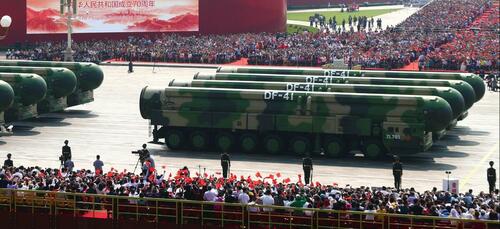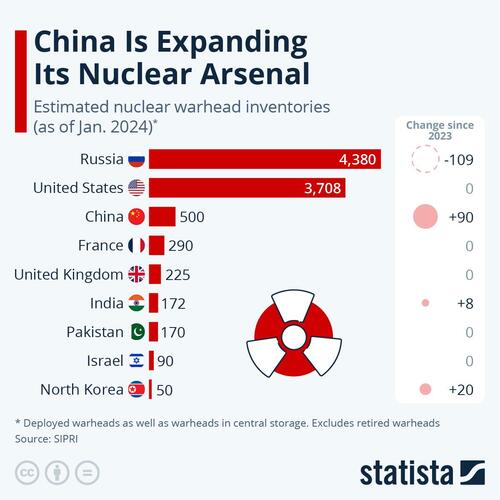
On Wednesday the US Defense Intelligence Agency (DIA) issued a new public intelligence estimate entitled "Nuclear Challenges 2024".
The detailed 194-page document includes an overview of chief nuclear-armed powers and rivals of the United States, focusing especially on countries with "mature nuclear weapons programs" which are said to be "increasing stockpiles" or else "modernizing their legacy stockpiles by incorporating advanced technologies to penetrate or avoid missile defense systems" - such as North Korea.

"Countries are also developing nuclear weapons with smaller yields, improved precision, and increased range for military or coercive use," the DIA says.
One nation's program is gaining the most attention as a result of the DIA report, and that's China. The intelligence agency assesses the country under President Xi is undergoing a huge and rapid expanse of its nuclear arsenal, which is the biggest in its history, assuming the projection is accurate.
The "Nuclear Challenges 2024" assesses that China is on track to possess more than 1,000 operational nuclear warheads by 2030.
The report contextualizes that this accelerated growth is being drive primarily by China's strategic competition with the Untied States.
Below is a section providing the DIA's bird's eye view summary of China's nuclear arsenal plans and expansion:
China. Beijing has far surpassed earlier growth estimates assessed in 2018, and is currently exceeding 500 deliverable nuclear warheads in its stockpile. By 2030, we estimate that China will have more than 1,000 operational nuclear warheads— most of which will be fielded on systems capable of ranging the continental United States. China probably also seeks lower-yield nuclear warhead capabilities to provide proportional response options that its high-yield warheads cannot deliver. For example, China is increasing its stockpile of theater-range delivery systems, such as the DF-26 intermediate-range ballistic missile (IRBM).
Below is a current snapshot of the global nuclear stockpile situation, as it stood by middle of this year...
You will find more infographics at Statista
As Statista's Anna Fleck reports, currently, there are estimated to be 9,585 nuclear warheads in military stockpiles for potential use across nine countries, with Russia and the U.S. accounting for 8,088 of these.
There are also an estimated 2,536 retired warheads that are yet to be dismantled. China has added 90 nuclear warheads to its arsenal since January 2023, increasing from 410 warheads to 500.
This is according to data from the peace research institute SIPRI. India and North Korea have also expanded their arsenals, bringing their total figures to an estimated 170 warheads and 50 warheads, respectively.
The two European nuclear powers, France and the UK, together have 515 operational nuclear warheads. With the exception of North Korea, none of the nations in possession of nuclear warheads have tested them since the 1990s.
On Wednesday the US Defense Intelligence Agency (DIA) issued a new public intelligence estimate entitled “Nuclear Challenges 2024”.
The detailed 194-page document includes an overview of chief nuclear-armed powers and rivals of the United States, focusing especially on countries with “mature nuclear weapons programs” which are said to be “increasing stockpiles” or else “modernizing their legacy stockpiles by incorporating advanced technologies to penetrate or avoid missile defense systems” – such as North Korea.

“Countries are also developing nuclear weapons with smaller yields, improved precision, and increased range for military or coercive use,” the DIA says.
One nation’s program is gaining the most attention as a result of the DIA report, and that’s China. The intelligence agency assesses the country under President Xi is undergoing a huge and rapid expanse of its nuclear arsenal, which is the biggest in its history, assuming the projection is accurate.
The “Nuclear Challenges 2024” assesses that China is on track to possess more than 1,000 operational nuclear warheads by 2030.
The report contextualizes that this accelerated growth is being drive primarily by China’s strategic competition with the Untied States.
Below is a section providing the DIA’s bird’s eye view summary of China’s nuclear arsenal plans and expansion:
China. Beijing has far surpassed earlier growth estimates assessed in 2018, and is currently exceeding 500 deliverable nuclear warheads in its stockpile. By 2030, we estimate that China will have more than 1,000 operational nuclear warheads— most of which will be fielded on systems capable of ranging the continental United States. China probably also seeks lower-yield nuclear warhead capabilities to provide proportional response options that its high-yield warheads cannot deliver. For example, China is increasing its stockpile of theater-range delivery systems, such as the DF-26 intermediate-range ballistic missile (IRBM).
Below is a current snapshot of the global nuclear stockpile situation, as it stood by middle of this year…
You will find more infographics at Statista
As Statista’s Anna Fleck reports, currently, there are estimated to be 9,585 nuclear warheads in military stockpiles for potential use across nine countries, with Russia and the U.S. accounting for 8,088 of these.
There are also an estimated 2,536 retired warheads that are yet to be dismantled. China has added 90 nuclear warheads to its arsenal since January 2023, increasing from 410 warheads to 500.
This is according to data from the peace research institute SIPRI. India and North Korea have also expanded their arsenals, bringing their total figures to an estimated 170 warheads and 50 warheads, respectively.
The two European nuclear powers, France and the UK, together have 515 operational nuclear warheads. With the exception of North Korea, none of the nations in possession of nuclear warheads have tested them since the 1990s.
Loading…





